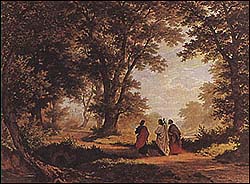
Dear God,
In today’s reading, we get to hear Luke’s story about the Road to Emmaus, when Jesus appeared to two disciples and pulls the same stunt that I do on my kids when I want the real skinny: he plays stupid.
The men are on their way to Emmaus when Jesus approaches them and asks what they are talking about.
“Are you kidding me?” the one named Cleopas responds, “You really aren’t filled in on all the gossip that’s going down these days?”
The disciples continue to be a tad dense. They finally figure it out when Jesus sits down to eat with them and breaks bread (Luke 24:13-35):
And it happened that, while he was with them at the table, he took bread, said the blessing, broke it, and gave it to them. With that their eyes were opened and they recognized him, but he vanished from their sight. Then they said to each other, “Were not our hearts burning within us while he spoke to us on the way and opened the Scriptures to us?”
Pope Saint Gregory interprets this to mean that God reveals himself insofar as a person is able to receive him; by the disciples’ act of hospitality (inviting the stranger to dinner), they became capable of recognizing God in the their midst. Says Gregory:
The Lord appeared to two disciples who were walking along the road, speaking about him, although, in fact, they did not believe in him. But he did not show them a face they could recognize; the Lord was thus revealing, on the outside, to the eyes of their body, what they were seeing inside, in the eyes of the heart. … As they listened to his teachings, they were not enlightened; it is by carrying them out that they saw the light.
I was reflecting on Gregory’s wisdom—that God reveals himself to us when we actively participate in love and grace–just this morning, as I prayed the Prayer of St. Francis, like I do every morning:
Lord, make me an instrument of your peace.
Where there is hatred, let me sow love;
where there is injury,pardon;
where there is doubt, faith;
where there is despair, hope;
where there is darkness, light;
and where there is sadness, joy.
O Divine Master, grant that I may not so much seek
to be consoled as to console;
to be understood as to understand;
to be loved as to love.
For it is in giving that we receive;
it is in pardoning that we are pardoned;
and it is in dying that we are born to eternal life. Amen
But I stopped at the second to last line: it is in pardoning that we are pardoned, and I started to tear up.
Recently a friend told me how hurt her feelings were by a piece that I published that wasn’t totally about her, but had hinted at specific issues in our relationship. My heart has felt like lead ever since she told me how hurt she was, and I’m fretting at not being able to patch it up neatly like I always want to do when confronting ugly stuff.
I’ve composed 50 apologies, and none of them is worded quite right. I’ve gone over my arguments, my logic, to throw at this the next time we talk. But I know part of the damage is done and there is no erasing it.
But upon reading Francis’s line about pardoning, and giving, and dying, and loving, and consoling, and so forth, I realize that the forgiveness has to start with me and all the hurts I hold inside. Because I will never allow the possibility of someone else forgiving me if I can’t let go of my own resentments. Moreover, the only thing I can do in this situation—and so many other people-pleasing complications that adult children of alcoholics seem to find—is to forgive on my end: the other person, but, even more so, myself.
Perhaps I haven’t felt that peace of the Road to Emmaus because I’m still too busy jabbering away at the gossip, instead of inviting the stranger to dinner, where Jesus reveals himself. Maybe by trying better at this forgiveness thing, those who I have hurt will find it in their hearts to forgive me.
